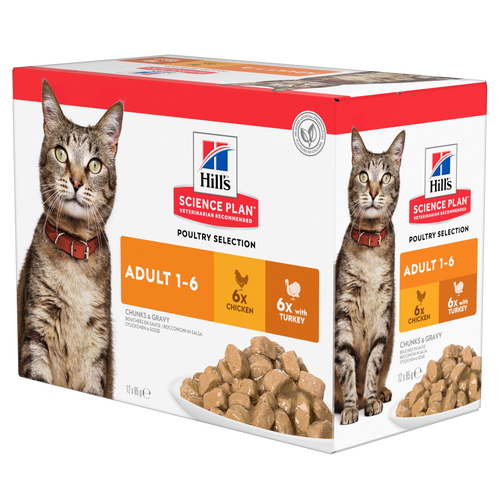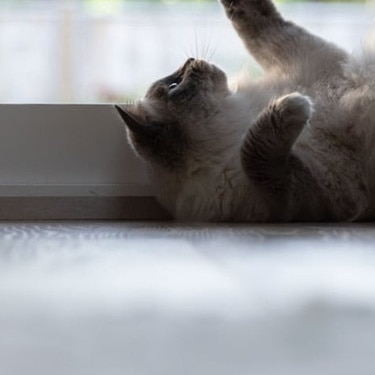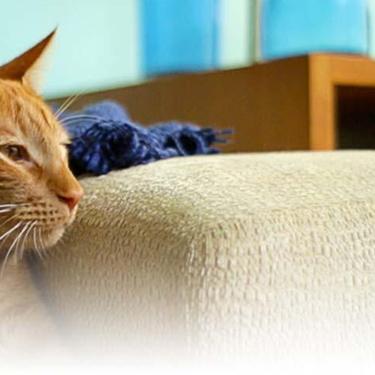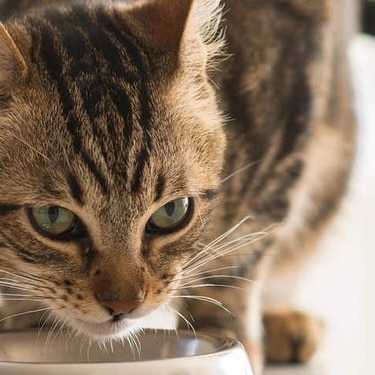
-
Find the right food for your petTake this quiz to see which food may be the best for your furry friend.Find the right food for your petTake this quiz to see which food may be the best for your furry friend.Featured products
 Mature Adult Dog Food
Mature Adult Dog FoodHill's Science Plan Mature Adult Multipack Wet Dog Food with Chicken & Beef are complete premium pet foods for mature adult dogs from 7 years. Your dog will love these deliciously smooth and savoury minced loaves, formulated to deliver the appropriate amount of energy to support the needs of adult dogs.
Shop Now Adult Wet Dog Food with Beef
Adult Wet Dog Food with BeefHill's Science Plan Adult Multipack Wet Dog Food with Chicken, Beef & Turkey are complete premium pet foods for adult dogs from 1 year. Your dog will love these deliciously smooth and savoury minced loaves, formulated for balanced nutrition and overall health.
Shop Now Puppy Food
Puppy FoodHill's Science Plan Puppy Multipack Wet Dog Food with Chicken & Beef are complete premium pet foods for growing puppies from weaning until 1 year old and for pregnant and nursing dogs. Your puppy will love these deliciously smooth and savoury minced loaves, formulated for balanced nutrition and overall health.
Shop NowFeatured products Mature Adult Wet Cat Food with Chicken
Mature Adult Wet Cat Food with Chicken
Tender chicken chunks in gravy for mature adult cats. Made with easy-to-digest ingredients, high-quality protein for lean muscle maintenance and antioxidant vitamins C+E for optimal health.
Shop Now Adult Multipack Wet Cat Food with Beef, Ocean Fish & Chicken
Adult Multipack Wet Cat Food with Beef, Ocean Fish & ChickenTender chunks in gravy for cats, with high-quality protein to maintain lean muscle. With vitamin E and omega-3s & -6s for healthy skin and balanced minerals to support healthy vital organs.
Shop Now Light Adult Multipack Wet Cat Food with Chicken & Ocean Fish
Light Adult Multipack Wet Cat Food with Chicken & Ocean FishTender chicken chunks in gravy for cats, with L-carnitine and fewer calories for ideal weight management. Packed with high-quality protein, omega-6s, and vitamin E for shiny fur and healthy skin.
Shop Now -
Dog
- Dog Tips & Articles
-
Health Category
- Weight
- Food & Environmental Sensitivities
- Urinary
- Digestive
- Joint
- Kidney
-
Life Stage
- Puppy Nutrition
- Adult Nutrition
- Senior Nutrition
Cat- Cat Tips & Articles
-
Health Category
- Weight
- Skin & Food Sensitivities
- Urinary
- Digestive
- Kidney
-
Life Stage
- Kitten Nutrition
- Adult Nutrition
Featured articles The Right Diet For Your Pet
The Right Diet For Your PetIn people, the right diet is very important. If you are eating the wrong way for your metabolism, activity level, age and lifestyle you could end up with health issues.
Read More The Incredible Science Behind Your Pet's Microbiome
The Incredible Science Behind Your Pet's MicrobiomeLearn what your pet's microbiome is, how it contributes to your pet's gut and overall health, and why nutrition is important in maintaining healthy microbiomes.
Read More Show some love with wet foods: a great choice for pets with health issues
Show some love with wet foods: a great choice for pets with health issuesShow some love with wet foods: a great choice for pets with health issues.
Read More -


Have you noticed that your cat comes running whenever you open a can of olives? Maybe you've even offered an olive to your cat, only to see them react with unbridled excitement. But should cats consume olives? What about olive oil? Although it can be a lot of fun to share these salty snacks with your cat, you'll want to consider a few things before you do.
Why Do Cats Love Olives?
There are no scientific studies that delve into the mysterious reasons as to why cats go crazy for olives, but there are some theories. Some cats may just love the taste or enjoy the interaction with you during treat time. Others may like the way they feel after eating olives. That's because olives, particularly green olives, contain an active chemical compound that's very similar in structure to a compound found in catnip called nepetalactone, according to Wired. Nepetalactone is the active chemical that is thought to be responsible for the silly behaviour that cats exhibit after consuming the leaves, stems and flowers of catnip.
Any unfamiliar and interesting scent, as could be Nepetalactone, cats use their vomeronasal organ to analyse it. As noted by Mental Floss, the vomeronasal organ is basically a sensing, smelling nose-brain located at the top of the back of the throat in cats and other mammals. The cat uses its mouth to suck in air which is filtered into the vomeronasal organ. The vomeronasal organ can also detect pheromones, which are chemical “messengers” that cats release from special glands around cats’ bodies to “communicate” among them. Specifically to Nepetalactone contained in catnip, cats use predominantly their accessory olfactory system that activates part of the brain involved in sexual behaviour. In general, Nepetalactone stimulates behaviours such as sniffing, chewing, rolling, rubbing and predatory behaviour. After consuming nepetalactone, your cat may roll around, act sillier and more playful than usual and have dilated eyes. Thereby, it is hypothesised that cats like olives because it leads to similar catnips’s effects.
Not all cats act silly after eating catnip or olives, though. Your cat may enjoy eating olives and experience no changes in their behaviour whatsoever after snacking on them.

Can Cats Eat Olives Safely?
In general, olives are not a dangerous food for cats; they're considered safe for them to consume in very small quantities. Eating a tiny olive snack, meaning less than a whole olive, a couple of times a week should be fine for your cat if they've eaten olives in the past without any negative side effects.
But can cats eat olives and olive oil? They're regarded as healthy snacks for humans, but olives should be considered purely empty-calorie treats for cats. And olive oil may not be a welcome addition in your cat's diet — more to come on that later. Though they may taste delicious and have an amusing effect on your cat's behaviour, olives are known to be high in sodium, and therefore, should make up no more than 10 percent of your cat's daily calories, as with any treat.


Tasty Tips
Can Cats Have Olive Oil?
Olive oil is considered a healthy part of human nutrition, but can cats eat olive oil? Yes, although it may not be a good idea.
Although olive oil isn't considered poisonous to cats, consuming too much of any fat, including olive oil, may cause your cat to experience diarrhoea and vomiting. If you use olive oil for cooking, a tiny piece of food cooked in it shouldn't be a cause for alarm if your cat eats some, as long as your cat doesn't exhibit any adverse health effects afterward. However, it should also be mentioned that olive oil is very high in fat content, and has its own inherent health risks, so always check with your veterinarian before feeding food not specifically formulated for cats.
Safety Concerns About Olives
Generally speaking, there are few safety concerns with cats eating olives or olive oil other than the possibility of mild stomach upset or diarrhoea. Avoid giving your cat olives in the future if you notice any negative side effects after they consume this snack.
Olives are often stuffed with delicious human-friendly treats, like blue cheese, almonds, garlic, sausage or pickled jalapenos. While olives are not considered to be toxic to cats, the items they're stuffed with may be. Avoid giving your cat olives stuffed with anything other than a pimento or olives that have pits, as pits can be a choking hazard or can cause intestinal obstruction if they're swallowed.
The other main concern with olives and olive oil is sodium toxicity. According to The Guardian, olives need to be cured before consumption, and a common way to cure them is through brining in salt water. Salt-brined olives are high in sodium, and feeding these to your cat on a regular basis may expose them to harmful levels of salt.
Olives aren't a good treat if your cat has health concerns with sodium, such as heart disease or kidney disease. It's also important to note that washing olives with water doesn't reduce the amount of sodium that's present in them. However, healthy cats can typically indulge in a quarter of a large olive or half of a small olive a couple of times a week without experiencing any negative health effects. Always try to limit any snacks separate from your cat's regular food to not exceed ten percent of their daily caloric content. Also, always check with your veterinarian before feeding any food not specifically formulated for cats.


Dr. Sarah Wooten graduated from UC Davis School of Veterinary Medicine in 2002. A member of the American Society of Veterinary Journalists, Dr. Wooten divides her professional time between small animal practice in Greeley, Colorado, public speaking on associate issues, leadership, and client communication, and writing. She enjoys camping with her family, skiing, SCUBA, and participating in triathlons.
Related products

Tender chicken chunks in gravy for mature adult cats. Made with easy-to-digest ingredients, high-quality protein for lean muscle maintenance and antioxidant vitamins C+E for optimal health.


Tender chunks in gravy for cats, with high-quality protein to maintain lean muscle. With vitamin E and omega-3s & -6s for healthy skin and balanced minerals to support healthy vital organs.

Tender chicken chunks in gravy for cats, with L-carnitine and fewer calories for ideal weight management. Packed with high-quality protein, omega-6s, and vitamin E for shiny fur and healthy skin.
Related articles

Find out about how you can support your cat's digestion to boost overall health. Diet is key to a long and happy life for your cat, so discover what you can do.

Feeding time can be a wonderful bonding opportunity for you and your cat. Find out how to make the most of it and create a healthy habit with HIll's Pet UK.

Find the right Hill

Discover what you can do to spot and support a sensitive cat stomach. See what routines and food you can implement to help your cat be happy and healthy.

Put your cat on a diet without them knowing
Our low calorie formula helps you control your cat's weight. It's packed with high-quality protein for building lean muscles, and made with purposeful ingredients for a flavourful, nutritious meal. Clinically proven antioxidants, Vitamin C+E, help promote a healthy immune system.
Put your cat on a diet without them knowing
Our low calorie formula helps you control your cat's weight. It's packed with high-quality protein for building lean muscles, and made with purposeful ingredients for a flavourful, nutritious meal. Clinically proven antioxidants, Vitamin C+E, help promote a healthy immune system.

